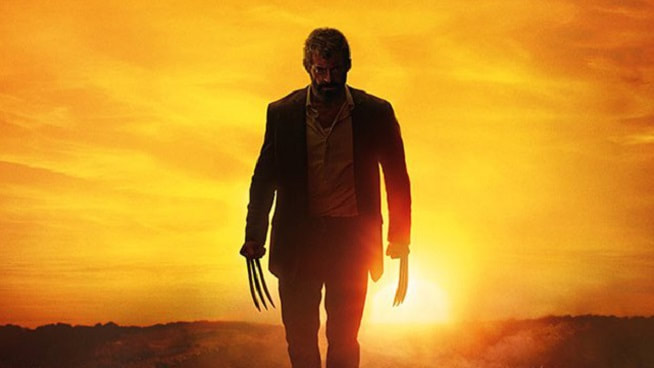‘LOGAN’ IS THE SEQUEL TO END ALL SUPERHERO SEQUELS
I think we’ve (all) lowered our standards for what we accept as great in the so-called “superhero” genre. But Logan is the latest and last film in the trilogy of Wolverine films, and Hugh Jackman could not have asked for a better way to end his long run as James “Logan” Howlett.
The film is directed by James Mangold, who was responsible for the mediocre previous entry in the series, “The Wolverine,” but is forgiven after having seen this. Logan is the superhero film, nay just film, we should be expecting out of today’s filmmakers.
I had the opportunity to speak to Mangold, and he pointed out that the stories that stick with us the most are the ones that speak to the heart. However, we’ve been overrun of late with stories that purely exist to cram all of our favorite spandexed characters together on one screen. Take the overwhelming number of characters expected to appear in the highly anticipated Avengers: Infinity War. There are supposedly 67 characters in the film (whose backstories Marvel films have been building out since…Iron Man came out in 2008). So If every character had just 5 minutes of the movie’s time to develop any sort of real arc, that’d be a 5-hour movie. Instead, these films rely on audiences having dedicating countless hours to the previous 9 years’ worth of films.
I’m certainly part of the problem. I get giddy every time they announce the umpteenth addition to the mega-ensemble films. I see all the movies in the franchises, even the terrible ones, because I don’t want to miss anything. However, after seeing Logan, which focuses so closely on the dynamics between three characters and ignores the rest, call me a convert. I want more of these emotionally gutting, dramatic films that just HAPPEN to feature people with extraordinary powers.
I’m certainly part of the problem. I get giddy every time they announce the umpteenth addition to the mega-ensemble films. I see all the movies in the franchises, even the terrible ones, because I don’t want to miss anything. However, after seeing Logan, which focuses so closely on the dynamics between three characters and ignores the rest, call me a convert. I want more of these emotionally gutting, dramatic films that just HAPPEN to feature people with extraordinary powers.
How do you get into Charles Xavier’s head?
Listen to what @SirPatStew has to say in this #Logan interview clip. pic.twitter.com/3EKq2OpvWL
— Google Play (@GooglePlay) March 4, 2017
Logan does cheat a little. The Wolverine films are spun off from the X-Men films, which began in 2000 with the namesake movie. Sir Patrick Stewart reprises the role of Professor Xavier rather than James McAvoy, who has also played the part. But throughout the 17-year course of the franchise, there has only ever been one actor in Wolverine’s claws, and it’s tough to say goodbye to Hugh Jackman in this role.
Mangold absolutely benefits from our emotional investment in these long-running characters, which makes his criticism of the rest of the genre a little unfair. We’ve grown to know and love them because we’ve been with them for so long. This also means the film is not the friendliest to new audiences.
The thing I appreciated most about it, though, was that it basically ignored the timelines that precede it. By setting the film 50 years in the future of wherever we last left off with both iterations of the X-Men cast, it wipes its hands clean of having to connect the dots in the very confusing multiverse the X-Men have created. Logan is also a step into the darker world of rated-R superhero films. There are some that have already laid the groundwork. “Deadpool” last year broke records, but its humorous tone holds it apart from the more self-serious X-Men, Avenger, or Justice League films.
It was lovely to see Hugh Jackman’s last outing in this role be such a dramatically meaty and elegant farewell. We should expect more from our superhero films, and Logan as a parting gift reminds us that it’s possible to have both quality and action.
Mangold absolutely benefits from our emotional investment in these long-running characters, which makes his criticism of the rest of the genre a little unfair. We’ve grown to know and love them because we’ve been with them for so long. This also means the film is not the friendliest to new audiences.
The thing I appreciated most about it, though, was that it basically ignored the timelines that precede it. By setting the film 50 years in the future of wherever we last left off with both iterations of the X-Men cast, it wipes its hands clean of having to connect the dots in the very confusing multiverse the X-Men have created. Logan is also a step into the darker world of rated-R superhero films. There are some that have already laid the groundwork. “Deadpool” last year broke records, but its humorous tone holds it apart from the more self-serious X-Men, Avenger, or Justice League films.
It was lovely to see Hugh Jackman’s last outing in this role be such a dramatically meaty and elegant farewell. We should expect more from our superhero films, and Logan as a parting gift reminds us that it’s possible to have both quality and action.
This article originally appeared on KFOG.com on March 6, 2017
